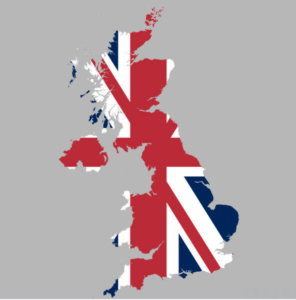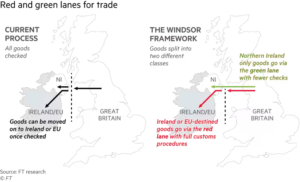 By Sam Parker, Treasurer at King’s Commercial Awareness Society
By Sam Parker, Treasurer at King’s Commercial Awareness Society
On the 27th of February, the UK prime minister, Rishi Sunak, and the president of the European Commission, Ursula von der Leyen, unveiled the new Brexit plan called the “Windsor Framework”- the outcome of four months of diplomacy between Westminster and the EU. The previous deal by Boris Johnson, the so-called Northern Ireland Protocol, is seen by most MPs as rushed and inconsiderate to those affected by such a critical decision.
The Northern Ireland Protocol put up trade barriers, increased political tensions in NI (Northern Ireland), was legally ambiguous and increased EU bureaucracy. Sunak knew that the hard border created by Johnson’s deal required renegotiation with the EU and so he made it his first bold move since the start of his premiership to do so.
Red and green lanes
To fix the problem of trade being heavily monitored for goods imported from Great Britain that stay within the Northern Irish border, Sunak includes a plan in the Windsor Framework that separates goods entering NI into two distinct categories- Red and green lanes. The goods that are destined for NI are put in the green lane while those that enter NI and are destined for the Republic of Ireland are put in the red.
The green lane allows companies to trade without the need for the overwhelming majority of paperwork that was previously required as long as goods are labelled with “not for EU”. As these labels are introduced from now until 2025, the proportion of consignments subject to identity checks will fall to about 5%. This should not only make NI feel closer to Britain, but it was also promised by Sunak that foreign investment will increase as the economy of NI becomes more efficient and the people can be governed correctly with less civil unrest.

State aid and VAT
Article 10 of the protocol mentions that any trade subsidy from the UK government that might affect NI must be referred to Brussels for approval. The new deal will remove 98% of these subsidies from being at risk of removal, which the UK believes will restore its sovereignty. VAT is another point of contention as NI could not adopt any UK tax rate changes. The agreement states that the UK will now be allowed to cut VAT to some extent for goods such as alcohol, yet it is not able to undercut the minimum EU tax rate in NI. There will be talks over the next 5 years to decide which goods the UK can cut tax for.
The role of Northern Ireland institutions
With the protocol, NI Institutions have no say in which EU rules they have to abide by. In most cases where a law is passed or updated by the EU, Northern Ireland will have to follow the new law. This has caused outrage by the Democratic Unionist Party (DUP) of NI and many of the pro- Brexit MPs. This issue, with all the tension it has caused, led Sunak to negotiate what we know now as the “Stormont break” which allows the government of NI to halt any new or updated EU legislation with 30 out of 90 votes from at least two different parties. Under the break, EU single market rules will not apply to NI until discussions are held between Brussels and London. However, the EU can choose to take remedial measures if Britain decides not to implement the measures that the EU deems important for NI to follow while being within the single market.
In January 2021, the DUP announced that its members would be withdrawing from all cross-border bodies established under the Good Friday Agreement, including the North-South Ministerial Council and the British-Irish Intergovernmental Conference. At the time, the party cited concerns over the operation of the Northern Ireland Protocol as the reason for the decision. They believe the deal weakened the union and discouraged foreign investments making the issue of a hard border largely a political and business issue. By giving Stormont some deciding power in implementing new EU rules, the “Stormont Break” was agreed by both the EU and the UK to be a vital aspect of the deal for bringing the DUP on board and hopefully ending their boycott of the Northern Irish Assembly.
Not much has been seen of Sunak since the start of his premiership. It was the assumption of many that he would continue to lay low and stay out of the same limelight that did not do any favours for his last two predecessors. But this new deal that has secretly been in the works for several months has changed many minds about the character and type of leader the UK has now. Sunak seems determined to get this deal done regardless of the opinions of MPs. On the 28th of February, Sunak stated that this deal is not about “any one party” referring to how he is indifferent to the concerns of the DUP or any other MP at this point of the process. He seems rather self assured and confident that this decision will “make a hugely positive difference” to the communities and businesses of NI. But, with such a delicate and multivariate situation to handle, anyone that holds a stake in Northern Irish trade and governance will have to wait and hope that this is not a repeat of the Johnson administration and that Brexit can finally be done in the best way possible for the EU, Great Britain and Northern Ireland.
I was very happy to seek out this web-site.I needed to thanks in your time for this wonderful read!! I positively having fun with each little bit of it and I have you bookmarked to check out new stuff you weblog post.
Just what I was searching for, regards for posting.
I like this weblog very much so much great information.
It’s exhausting to search out educated people on this matter, but you sound like you know what you’re speaking about! Thanks